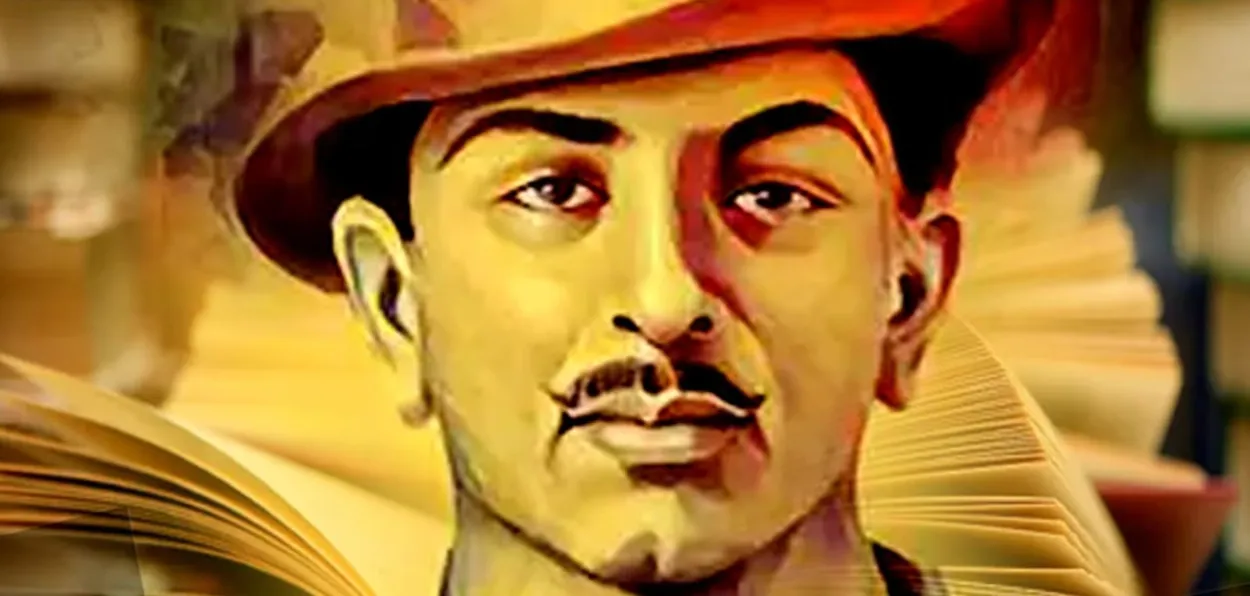
Saquib Salim
Many Indians feel that Bhagat Singh, who was born on this day in 1907, could have been saved if Mahatma Gandhi had willed. The detractors of Gandhi often allege that he was complicit in hanging Bhagat Singh and his associates Rajguru and Sukhdev.
A Slice Of History
The fact is that Gandhi’s stand on capital punishment for Bhagat Singh was complex. As a proponent of non-violence, he could not ask his followers to make a hero out of armed revolutionaries and emulate their examples. But, as a leader of the Indian nation, he had to try to save these revolutionaries. The result was a complex approach where he asked the British Government to commute the death sentence, but told his followers not to follow the footsteps of Bhagat Singh.
Bhagat Singh was hanged in Lahore on 23 March 1931. On 29 March, Gandhi wrote in Navjivan, “Brave Bhagat Singh and his two associates have been hanged. Many attempts were made to save their lives, and even some hopes were entertained, but all was in vain.
“Bhagat Singh did not wish to live. He refused to apologise; he declined to file an appeal. If at all he would agree to live, he would do so for the sake of others; if at all he would agree to it, it would be so that his death might not provoke anyone to indiscriminate murder. Bhagat Singh was not a devotee of non-violence, but he did not subscribe to the religion of violence; he was prepared to murder out of a sense of helplessness. His last letter was as follows: "I have been arrested while waging a war. For me, there can be no gallows. Put me into the mouth of a cannon and blow me off." These heroes had conquered the fear of death. Let us bow to them a thousand times for their heroism.”
The admiration was not an afterthought. He actually raised the issue of Bhagat Singh with the British Government. Viceroy Lord Irwin, in his report of a meeting with Gandhi on 18 February 1931, wrote that after the meeting was over, Gandhi raised the issue of Bhagat Singh, but he denied any clemency.
Gandhi reportedly told the Viceroy, “This has no connection with our discussion, and it may even be inappropriate on my part to mention it. But if you want to make the present atmosphere more favourable, you should suspend Bhagat Singh's execution."
Gandhi further said, “He is undoubtedly a brave man, but I would certainly say that he is not in his right mind. However, this is the evil of capital punishment, that it gives no opportunity to such a man to reform himself. I am putting this matter before you as a humanitarian issue and desire suspension of sentence in order that there may not be unnecessary turmoil in the country. I myself would release him, but I cannot expect any Government to do so.”
On 7 March, addressing a public meeting, Gandhi said that the anger among youth was justified over the sentence against Bhagat Singh, but they should understand that only by winning freedom can he be freed from jail. In his opinion, armed struggle would not bring the goal of freedom. He said, “God willing, Bhagat Singh and others are alive when we have arrived at the proper stage, they would not only be saved from the gallows but released.”
Again on March 19, Gandhi asked the Viceroy to consider the termination of the death sentence to Bhagat Singh. Two days later, Gandhi told the press that if Bhagat Singh was hanged, it would harm the prospects of the Gandhi-Irwin pact as well.
On 23 March, a day before the scheduled hanging of Bhagat Singh, Rajguru and Sukhdeo, Gandhi wrote a letter to the Viceroy appealing for the termination of the sentence.
He wrote, “Popular opinion, rightly or wrongly, demands commutation. When there is no principle at stake, it is often a duty to respect it.
“In the present case, the chances are that, if commutation is granted, internal peace is most likely to be promoted. In the event of execution, peace is undoubtedly in danger….. Since you seem to value my influence such as it is in favour of peace, do not please unnecessarily make my position, difficult as it is, almost too difficult for future work.
“Execution is an irretrievable act. If you think there is the slightest chance of error of judgment, I would urge you to suspend for further review an act that is beyond recall.”
The British Government hanged Bhagat Singh a day prior on 23 March. Gandhi called for protests and issued a statement saying, “It is my conviction that the grave blunder committed by the Government has increased our power to win freedom, and Bhagat Singh and his comrades have embraced death therefore. Let us not throw away this opportunity by doing anything in anger. It is beyond dispute that there will be a general strike and we cannot honour the deceased patriots better than by taking out absolutely peaceful and dignified processions.”
Three days later, at the Karachi session of Congress, Gandhi said, “By the executions the Government has given the nation grave cause for provocation. It has shocked me too, since my negotiations and talks had made me entertain a distant hope that Bhagat Singh, Rajguru and Sukhdev might be saved. I am not surprised that young men are angry with me for not having been able to save them.”
ALSO READ: Muslim village Pabaratipur is center of wig-making for Puja idols
On the one hand, Gandhi asked the British government to terminate the sentence and called Bhagat Singh a brave man, but on the other, he asked his followers not to follow his footsteps. The evidence we have shows that Gandhi did try to save Bhagat Singh.
